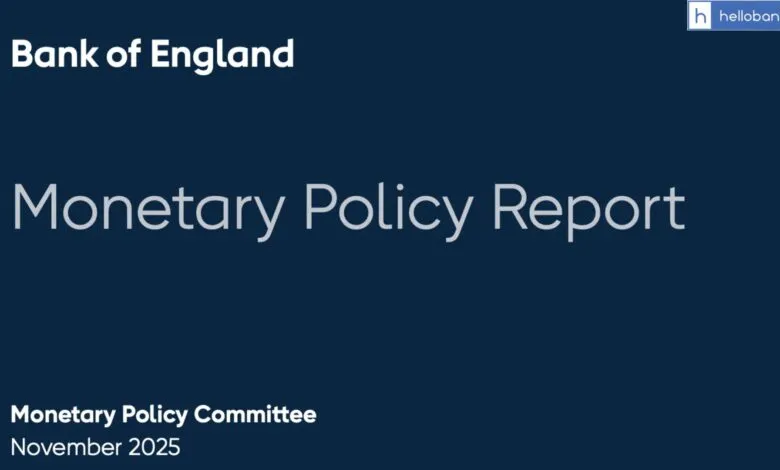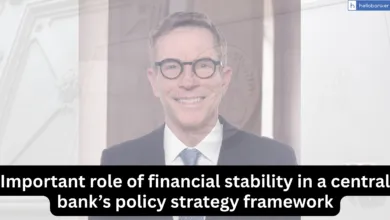Bank of England Keeps Interest Rate at 4%, Download Monetary Policy Report November 2025 PDF

The Monetary Policy Committee (MPC) of the Bank of England ended its meeting on 5 November 2025 with a close vote on interest rates. By a 5–4 majority, the Committee decided to keep the Bank Rate unchanged at 4%. Four members voted to cut the rate by 0.25%, bringing it down to 3.75%.
Download Monetary Policy PDF (This PDF is available for Premium Users Only. Click here to join premium)
Download Voting History of UK Monetary Policy (This PDF is available for Premium Users Only. Click here to join premium)
Inflation Outlook Improving
The MPC noted that CPI inflation has now peaked, and underlying price pressures are continuing to ease. This improvement is supported by the still-restrictive monetary policy in place. Pay growth and services inflation have begun to slow, showing that high interest rates are helping reduce inflation. The slowdown in the economy and signs of easing pressure in the labour market are also helping bring down inflation.
Balancing Inflation and Growth Risks
The Committee said monetary policy is being set to ensure inflation returns to the 2% target in a stable, sustainable way. Risks of inflation staying high have reduced recently, while risks of weaker economic demand have increased. Overall, risks are now more evenly balanced—but more data is needed to confirm the trend.
As interest rates have already been reduced from their peak, the MPC said future rate cuts will depend on how inflation moves. If inflation continues to fall steadily, the Bank Rate may be lowered gradually in the coming months.
Key Points from the Committee Discussion
1. Disinflation is Continuing
Members agreed that underlying inflation pressures are easing. Services inflation and wage growth have both slowed. However, some members differed on how strongly wage moderation will reduce future inflation.
2. CPI Inflation Has Likely Peaked
This year’s rise in headline inflation was driven mainly by:
- Base effects in energy prices
- One-off food supply disruptions
- Increases in government-controlled prices
These factors are considered temporary. But the MPC is watching household inflation expectations closely, as these can influence wage demands and pricing behaviour.
3. Different Inflation Scenarios
The Bank’s November Monetary Policy Report presented two risk scenarios:
- Scenario 1: Inflation could stay higher for longer if past price rises continue to influence wages and prices.
- Scenario 2: Inflation could fall faster if household spending weakens more than expected.
Most members attached some probability to both scenarios.
4. Labour Market Showing More Slack
The labour market is gradually loosening. Some members believe weak consumption and employment growth indicate rising spare capacity, which helps reduce inflation. Others think structural changes in the labour market may limit how much spare capacity develops.
5. Effect of Past Interest Rate Hikes
The Committee acknowledged that past rate hikes are now weighing on demand, helping cool inflation. Some members worry this may lead to inflation falling below target in the medium term, while others believe more evidence is needed to confirm the extent of slowing.
6. When to Reduce Remaining Policy Tightness
Members discussed the risks of cutting rates too quickly or too slowly. They agreed more information is needed before deciding on further reductions. As the Bank Rate moves closer to its “neutral level,” it becomes harder to judge how much it is helping reduce inflation.
7. Risks Now More Balanced
Overall, recent data suggests:
- The risk of stubborn inflation has decreased.
- The risk of weaker demand has increased.
However, the Committee stressed that more evidence is needed before taking further actions.
Next Steps
The MPC will closely monitor:
- Labour market conditions
- Wage growth and future pay settlements
- Services price inflation
- Business pricing power
- Upcoming key data, including the UK Budget on 26 November
Global factors were less important in this meeting but will continue to be reviewed.
